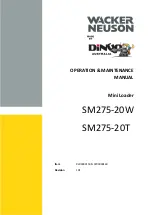
8
SECTION 00 - INTRODUCTION
2.6
BATTERY
Batteries give off explosive gases.
Never handle naked flames and unshielded light
sources near batteries, never smoke.
To prevent any risk of explosion, observe the follow-
ing instructions:
Z
when disconnecting the battery cables, always dis-
connect the negative (-) cable first;
Z
to reconnect the battery cables, always connect the
negative (-) cable last;
Z
never short-circuit the battery terminals with metal
objects;
Z
do not weld, grind or smoke near a battery.
Battery electrolyte causes severe burns. The battery
contains sulphuric acid. Avoid any contact with the
skin, eyes or clothing.
Antidote:
Z
EXTERNAL: rinse well with water, removing any
soiled clothing.
Z
INTERNAL: avoid vomiting. Drink water to rinse
your mouth. Consult a doctor.
Z
EYES: rinse abundantly with water for 15 minutes
and consult a doctor.
Z
When the electrolyte of a battery is frozen, it can
explode if you attempt to charge the battery or if
you try to start the engine using a booster battery.
Always keep the battery charged to prevent the
electrolyte freezing.
Provide good ventilation when changing a battery or
using a battery in an enclosed space. Always protect
your eyes when working near a battery.
Never set tools down on the battery. They may in-
duce a short circuit, causing irreparable damage to
the battery and injuring persons.
Never wear metal necklaces, bracelets or watch-
straps when working on the battery. The metal parts
may induce a short circuit resulting in burns.
Dispose of used batteries separately from other
waste in the interests of environmental protection.






























